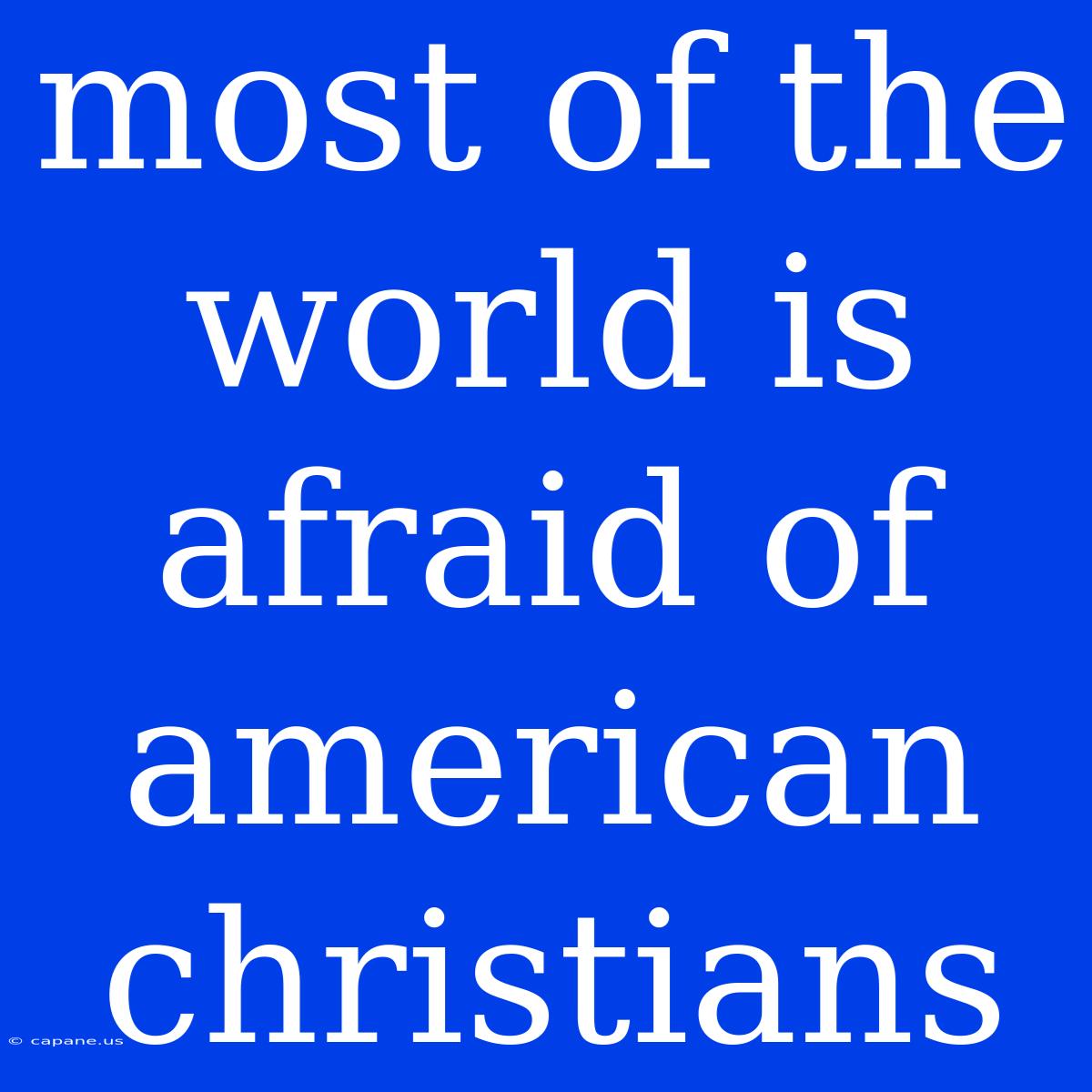The Global Perception of American Christians: A Complex Tapestry
Are American Christians feared worldwide? This question, while provocative, necessitates a nuanced exploration of global perceptions. While it's inaccurate to claim a universal fear, certain aspects of American Christian culture have indeed sparked anxieties and misunderstandings abroad.
Editor Note: This article delves into the global perspective on American Christianity, examining the complex factors that contribute to both positive and negative perceptions.
Understanding this dynamic is crucial because it sheds light on how cultural and religious identities intersect on the global stage, influencing international relations, diplomacy, and even personal interactions.
Analysis: This article examines diverse perspectives through a comprehensive review of academic studies, news reports, and public opinion surveys. It explores the historical and contemporary factors that have shaped global perceptions of American Christians, considering both the positive and negative aspects.
Key Takeaways
| Factor | Description | Implications |
|---|---|---|
| Historical Influence: | American Christianity has been influential in global missionary work, humanitarian efforts, and the development of democratic institutions. | This has fostered both admiration and suspicion, depending on the context and the recipients' experiences. |
| Political Engagement: | American Christians are often politically active, and their stances on issues like abortion, same-sex marriage, and religious freedom have sparked debates internationally. | These debates can generate tensions, particularly in countries with different cultural and religious norms. |
| Media Portrayal: | American media, including movies, TV shows, and news outlets, frequently depict American Christians in ways that can reinforce stereotypes or create misconceptions. | The global audience's understanding of American Christians is significantly shaped by media representations, often creating exaggerated or distorted perceptions. |
| Cultural Differences: | American Christianity, with its emphasis on individualism and consumerism, can be perceived as different from Christianity in other parts of the world, leading to misunderstandings. | These cultural differences can create a sense of distance or even alienation, further fueling anxieties about American Christian influence. |
American Christianity in a Global Context
The Role of History
Historically, American Christianity has played a significant role in shaping global religious landscapes. From early missionary efforts to the establishment of institutions like universities and hospitals, American Christians have left an undeniable imprint across continents.
The Impact of Missionaries: American Protestant missionaries, particularly in the 19th and 20th centuries, established a vast network of churches, schools, and healthcare facilities in many parts of the world. Their work, often motivated by a sincere desire to spread the Gospel, contributed to the growth of Christianity in various regions, from Africa and Asia to South America.
However, the missionary movement also faced criticism and resistance. Critics accused missionaries of imposing their own cultural and religious norms on indigenous populations, undermining local traditions, and contributing to colonialism. This historical legacy of colonialism and cultural imposition continues to influence global perceptions of American Christianity, particularly in former colonies.
Political Engagement and Global Tensions
American Christians are known for their active involvement in politics. They often mobilize around issues related to family values, religious freedom, and the role of religion in public life. This engagement can create tensions in the international arena, particularly when American Christian perspectives on issues like abortion, same-sex marriage, and religious freedom clash with views held in other countries.
The Rise of Religious Nationalism: The rise of religious nationalism in the United States, coupled with the increasing influence of evangelical Christians in politics, has contributed to anxieties about American Christian dominance in global affairs. Critics argue that the entanglement of religion and politics in the United States creates a climate of intolerance and prejudice, potentially undermining democratic values and human rights.
Media Portrayal and Stereotyping
The media plays a crucial role in shaping global perceptions of American Christians. Movies, TV shows, and news outlets often portray American Christians in ways that reinforce existing stereotypes or create misconceptions about their beliefs and practices.
Negative Portrayals: American Christians are often depicted as conservative, judgmental, and intolerant, particularly in media representations of the South and the “Bible Belt.” These portrayals, while not always accurate, contribute to a distorted understanding of American Christianity abroad.
Positive Portrayals: While negative portrayals dominate, there are instances where American Christians are depicted in a more positive light. Movies like “The Blind Side” or TV shows like “This Is Us” often feature characters who embody compassion, empathy, and social justice, offering a counterpoint to the prevailing negative stereotypes.
Cultural Differences and Misunderstandings
American Christianity, with its emphasis on individualistic values and consumerism, can be perceived as distinct from Christianity practiced in other parts of the world. This cultural gap can lead to misunderstandings and even resentment.
Western Individualism vs. Collective Identity: In many cultures, Christianity is deeply interwoven with community life, emphasizing shared values and a collective sense of identity. American Christianity, with its focus on individual salvation and personal religious experience, can appear individualistic and self-centered compared to these more communal expressions of faith.
Consumerism and Prosperity Gospel: The emphasis on material prosperity within some American Christian denominations, known as the “prosperity gospel,” has also drawn criticism. Critics argue that this focus on wealth and success contradicts the core values of Christian teachings, particularly its emphasis on humility and service to others.
Conclusion: Navigating Complexity
The global perception of American Christians is a complex tapestry woven from historical influences, political engagement, media portrayals, and cultural differences. While fear may not be a universal response, anxieties and misunderstandings exist due to the perceived influence of American Christian values and practices on international affairs.
Navigating this complexity requires open dialogue, cultural sensitivity, and a willingness to challenge stereotypes and misconceptions. Recognizing the diversity within American Christianity itself, embracing a spirit of humility, and engaging in constructive conversations about the challenges and opportunities of globalization are crucial steps in fostering understanding and promoting respect between cultures.

